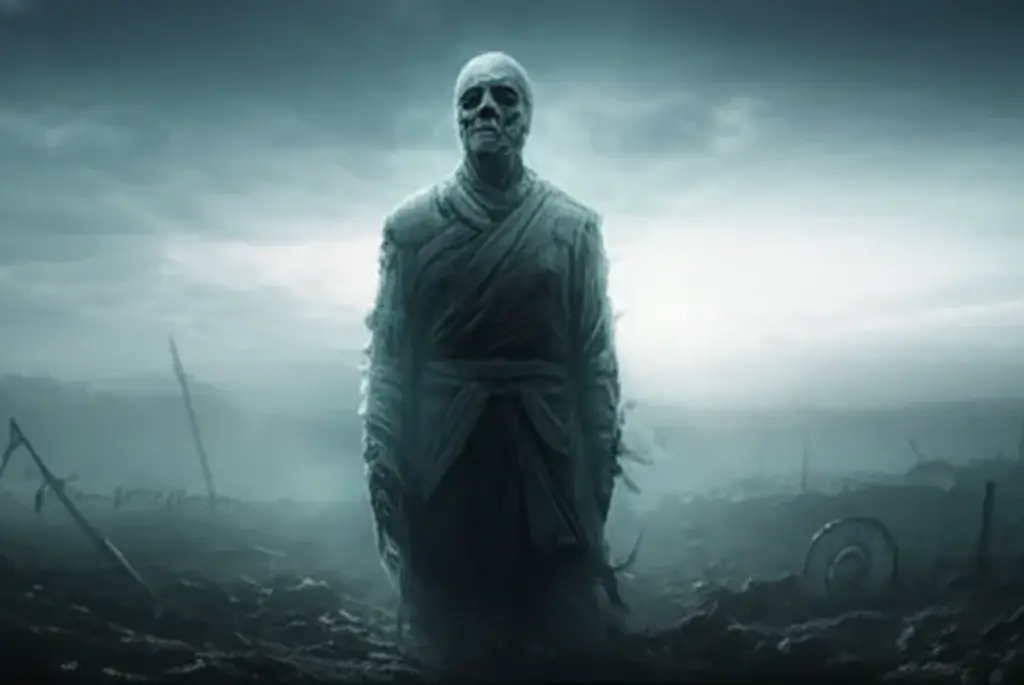The Battlefield Ghost, known in Chinese as Zhànchǎng Guǐ (战场鬼), is not a single named entity but a collective term for the vengeful spirits of soldiers who died violently in war, especially those left unburied or forgotten on ancient battlefields.

Also referred to as Yegui (野鬼 – “wild ghosts”) or Wanghun (亡魂 – “lost souls”), these ghosts of fallen warriors are deeply rooted in Chinese spiritual beliefs, where improper burial and unresolved death prevent the soul from entering the afterlife.
These spirits are believed to haunt former war zones, driven by unresolved rage, sorrow, and injustice. In Chinese culture, the belief in battlefield ghosts reflects deep fears of sudden death, the brutality of war, and the critical importance of proper funeral rites for spiritual peace.
Information
- Name: Battlefield Ghost (战场鬼 – Zhànchǎng Guǐ), also called Yegui (野鬼), Wanghun (亡魂), spirit of fallen soldiers
- Age: Over 2,300 years, originating from the Spring and Autumn – Warring States period (770–221 BCE), particularly after massive battles like the Battle of Changping (260 BCE) that left hundreds of thousands dead and unburied
- Gender: Not specified – includes both male and female, though primarily male soldiers
- Abilities: Appearing at night, creating phantom war sounds, causing sudden cold winds, nightmares, and psychological distress; some are said to drive people insane or appear in dreams
- Interests: Haunting ancient battlefield sites, seeking proper burial, demanding justice, and being appeased through ancestral offerings and spiritual rituals
Origin
Belief in battlefield ghosts began during the Spring and Autumn and Warring States periods, when constant warfare between feudal states left countless bodies abandoned on battlefields. A key example is the Battle of Changping (260 BCE), where Qin general Bai Qi ordered the execution and mass burial of over 400,000 Zhao captives.
According to Records of the Grand Historian (Shiji) by Sima Qian, local villagers in Shangdang (modern-day Shanxi) reported hearing screams, clashing weapons, and horse neighs at night long after the battle. No one dared to pass through the area after dark. Over time, people came to believe that the souls of soldiers denied proper burial remained trapped, filled with resentment and unable to move on.
This belief was reinforced during the Han Dynasty, when spiritual doctrines on soul duality (hun and po) and the afterlife became formalized. Soldiers who died in battle—especially those unidentified or unclaimed—were considered Yegui, restless spirits that could haunt the living if not properly honored or pacified.
Characteristics
Battlefield ghosts typically appear as shadowy figures in tattered armor, with blurred or faceless features, accompanied by unnatural fog, cold winds, and echoes of war such as drums, war cries, or clashing swords. They are most active during the Ghost Festival (Zhongyuan Jie) on the 15th day of the 7th lunar month, when the gates of the underworld are believed to open.
Folk accounts describe them appearing in dreams, weeping or begging for reburial or justice. In regions like Shanxi, Hebei, and Shaanxi—former battlegrounds of the Qin-Zhao wars and the Three Kingdoms—locals remain wary of strange nighttime sounds, interpreting them as signs of restless war spirits. Sites such as the Changping Ancient Battlefield still attract visitors who burn incense and joss paper to appease the dead, reflecting the enduring belief that unresolved spiritual unrest can harm the living.
Cultural Significance
The belief in battlefield ghosts reflects deep reverence for the dead, fear of war’s legacy, and the importance of spiritual closure in Chinese tradition.
Historically, dynasties erected martyrs’ memorials and held state rituals to honor fallen soldiers and calm their spirits. In literature, warfield hauntings appear in classical works like Strange Tales from a Chinese Studio (Liaozhai Zhiyi) by Pu Songling and Youyang Zazu from the Tang Dynasty.
In modern media, the theme persists in Chinese horror films and series such as The Mobo Chronicles (2023) and Candle in the Tomb: Mu Ye Gui Shi (2017), where ancient battlefields are depicted as spiritually dangerous zones haunted by vengeful soldiers.
In rural areas of Guangdong, Hubei, and Shanxi, locals still burn joss paper, offer incense, and perform rituals at unmarked graves to soothe the spirits of unknown soldiers and prevent hauntings. These practices show that the spirit of the battlefield ghost is more than folklore—it is a symbol of collective memory, wartime trauma, and the enduring human need for spiritual peace.
